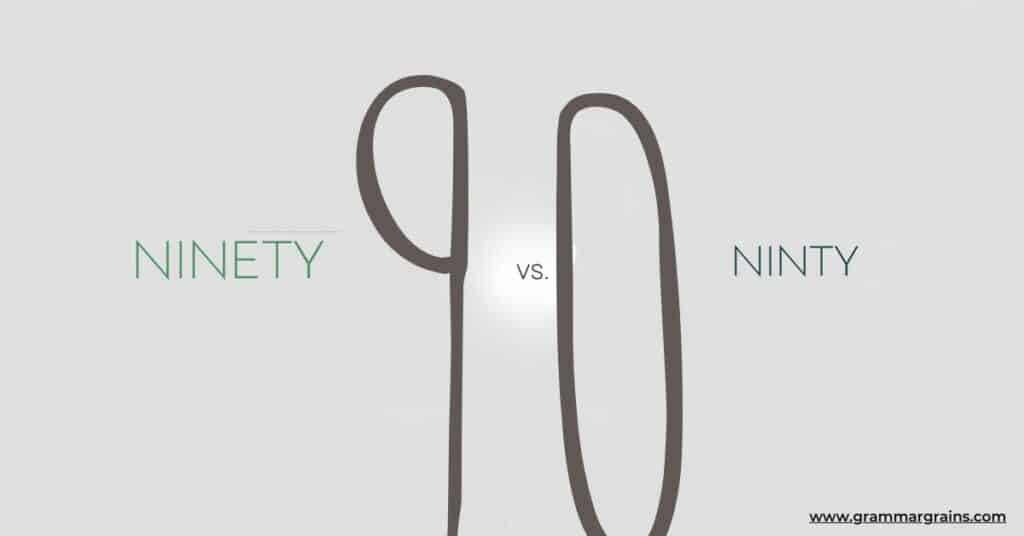Introduction
The English language is full of quirks, and spelling is no exception. One common confusion is the correct spelling of the number 90: is it “ninty” or “ninety”? While “ninety” is the correct form, “ninty” often sneaks into informal writing due to its phonetic similarity.
Understanding why “ninety” is correct and why “ninty” is considered a misspelling is not just about memorizing rules. It’s about appreciating the historical and linguistic roots of the word and learning practical strategies to avoid common mistakes.
Why This Debate Matters
Language is a tool for communication, and precision in language fosters clarity and understanding.
Missteps in spelling can lead to misunderstandings, especially in formal writing.
Imagine drafting a business proposal, educational material, or even a social media post, only to have readers question your credibility because of a simple error.
In the professional world, such mistakes may impact perceptions of professionalism and attention to detail.
For students, educators, and anyone working in fields where the English language is a key medium, mastering correct spelling is non-negotiable.
Even in casual conversation, errors like using “ninty” instead of “ninety” can subtly shape others’ perceptions of your language proficiency.
Common Confusion Between Ninty and Ninety
The confusion between “ninty” and “ninety” stems largely from how the word sounds. Phonetically, both forms can appear interchangeable to non-native speakers or even native speakers who haven’t encountered the word in formal contexts.
This is especially true when rapid speech masks the distinction between the “e” in “ninety” and the nonexistent “e” in “ninty.”
Adding to this mix-up is the fact that English has several irregular spelling rules.
Unlike some languages with consistent spelling rules, English often deviates from patterns.
For instance, while numbers like sixty, seventy, and eighty follow the “-ty” suffix, the spelling of “ninety” involves a vowel shift that doesn’t intuitively match its pronunciation.
Understanding the Basics: Ninety vs. Ninty
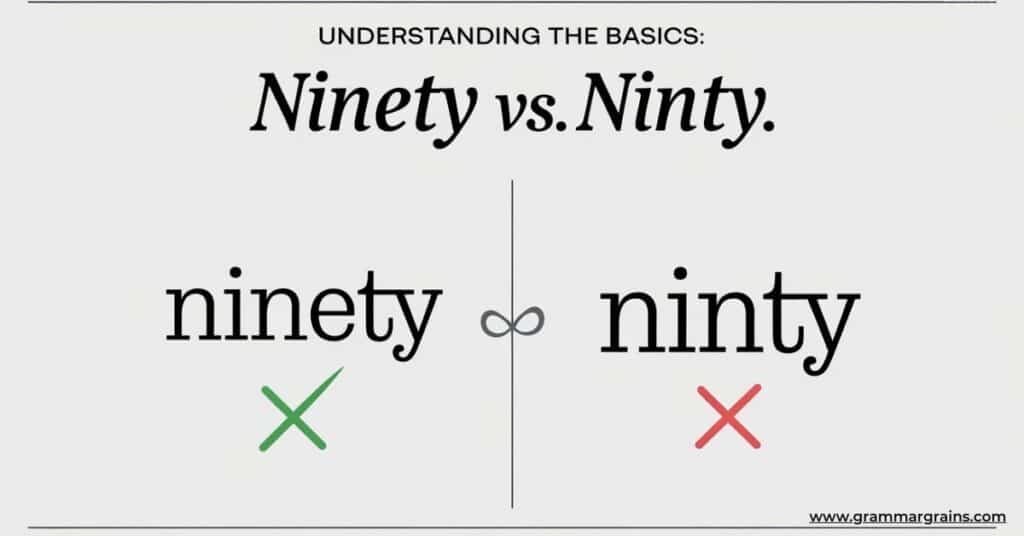
To break it down, “ninety” is the correct spelling of the number 90. This word follows the pattern of cardinal numbers in the English language, representing ten groups of nine.
In contrast, “ninty” is a misspelling—an error resulting from phonetic interpretation rather than adherence to spelling rules.
The root of the confusion lies in the linguistic evolution of English.
Historically, spelling conventions were less standardized, and regional variations in pronunciation often influenced how words were written.
Over time, however, “ninety” emerged as the universally accepted form in written English, particularly after dictionaries formalized language consistency.
Definition & Meaning of 90
The number 90, or “ninety,” represents a quantity that is the product of nine times ten.
It also holds symbolic significance in various fields:
- In mathematics, 90 degrees is a right angle, foundational to geometry.
- In finance, phrases like “ninety thousand dollars” often appear in business or economic contexts.
- In daily life, casual mentions such as “ninety bucks” are common in conversations about money.
Understanding how to spell and use this number correctly is crucial, especially when it’s part of larger numeric expressions or formal documentation.
Is It ‘Ninty’ or ‘Ninety’?
To put it simply, “ninty” is incorrect, and “ninety” is the correct spelling.
This distinction is not arbitrary but rooted in historical and phonetic reasoning.
Dictionaries across the globe, including Oxford and Merriam-Webster, recognize “ninety” as standard. So why does “ninty” persist? For one, it’s an easy error to make, given that similar-sounding numbers like twenty or seventy do not involve internal vowel changes.
Additionally, the silent “e” in “ninety” isn’t immediately apparent in spoken English, leading to confusion in its written form.
The Correct Spelling Explained
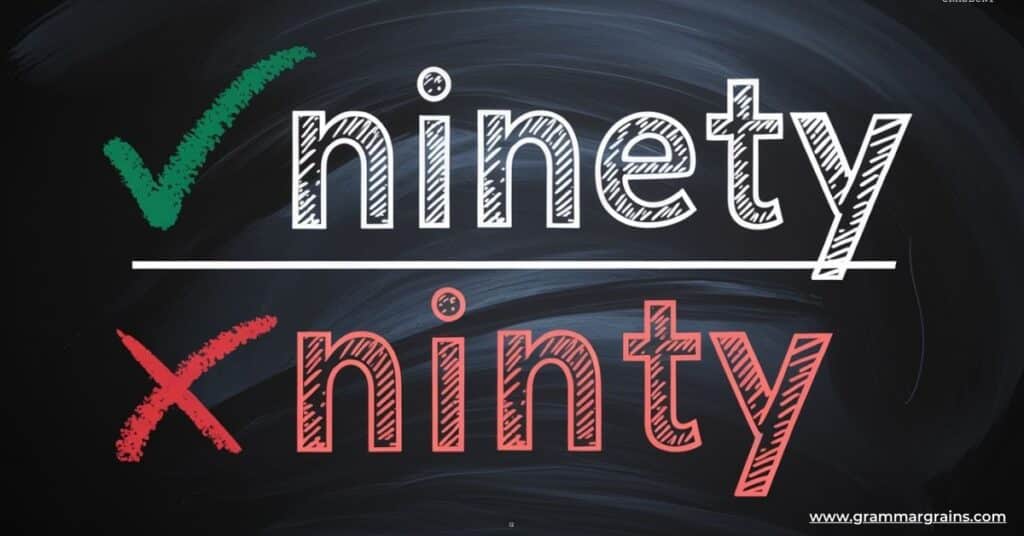
The correct spelling of 90 as “ninety” follows established linguistic rules.
The word originates from Old English, where “nigontig” (the term for 90) underwent simplification over centuries.
As English evolved, it adopted standardized forms, leading to the modern “ninety.”
The inclusion of the silent “e” in “ninety” is an example of English’s spelling patterns, which often prioritize historical roots over phonetic simplicity.
These patterns can seem inconsistent, but they reflect the language’s rich and varied history.
Why ‘Ninty’ Is Incorrect
The spelling “ninty” fails to align with English spelling rules or the word’s historical etymology.
While it mirrors the pronunciation, it disregards the silent “e,” which is crucial for accuracy.
Moreover, using “ninty” in writing—whether in essays, emails, or even social media posts—can signal a lack of attention to detail or familiarity with the Engblish languabge.
Avoiding this error is not just about looking polished; it’s also about respecting the conventions that make English a shared and understandable medium of communication.
The Old English Origins of Ninety
Tracing the roots of “ninety” back to Old English reveals fascinating insights.
The word “nigontig” combined “nigon” (nine) with “tig” (a suffix denoting tens).
Over centuries, linguistic shifts simplified its structure, but remnants of the original form remain in modern spelling. Understanding these origins can help demystify why certain spellings persist.
While the logic of phonetics might suggest “ninty,” the historical continuity of “ninety” preserves a linguistic connection to English’s past.
The Evolution of Spelling in English
English spelling has undergone numerous transformations, shaped by influences from Old English, Latin, French, and other languages. These changes often prioritized retaining etymological accuracy over phonetic simplicity, resulting in words like “ninety” that defy straightforward pronunciation rules.
Such complexities are not unique to numbers.
Words like “knight” and “bough” illustrate the same tension between spelling and pronunciation, emphasizing the importance of studying word origins to avoid common errors.
The Impact of Language Changes on Modern Words
Over centuries, English has absorbed elements from various languages, adapting and evolving into the complex system we use today.
With every evolution, spelling rules have shifted, sometimes aligning with pronunciation and other times diverging from it.
Words like “ninety” reflect this divergence, where historical influences outweigh phonetic logic.
This inconsistency in spelling creates challenges for learners and even native speakers.
For instance, “ninty” might seem logical based on patterns seen in words like “twenty” or “thirty.” However, understanding the historical evolution of “ninety” allows us to appreciate its unique place in the English lexicon.
Such insights not only clarify spelling but also deepen our grasp of how language shapes communication.
The Importance of Correct Spelling
Why does getting the spelling of a number like “ninety” matter?
Correct spelling is more than a technical requirement; it’s a cornerstone of effective communication.
Imagine submitting a resume or a professional email with spelling mistakes—it might make readers question your attention to detail or overall credibility.
Spelling impacts how others perceive us.
Whether you’re writing a formal letter, a blog post, or even a casual message, using the correct form of a word ensures your ideas are understood without distraction.
It’s especially crucial in formal writing, where accuracy reflects professionalism and respect for your audience.
Why It Matters
The spelling of words may seem minor, but it carries weight in various contexts.
Missteps like writing “ninty” instead of “ninety” can lead to misunderstandings, particularly when numbers are central to the message.
In fields like education, business, or media, errors in numebral usage can undermine the credibility of the work.
Beyond professional settings, the ability to spell words like “ninety” correctly enhances personal confidence in language skills.
It eliminates ambiguity and ensures your writing resonates clearly, whether it’s shared on social media platforms like Facebook or Twitter or used in personal correspondence.
The Impact of Spelling on Perception and Communication

A single spelling error can shape how your message is received.
For instance, using “ninty” in a document might suggest carelessness or lack of knowledge, even if the rest of your writing is polished.
In contrast, consistently using the correct spelling, like “ninety,” demonstrates a commitment to accuracy and attention to detail.
In social media, where brevity often takes precedence over correctness, spelling mistakes can still draw criticism.
Platforms like Pinterest or Twitter thrive on clear and engaging content, where a well-spelled post can stand out in a sea of errors.
Avoiding Misunderstandings in Writing
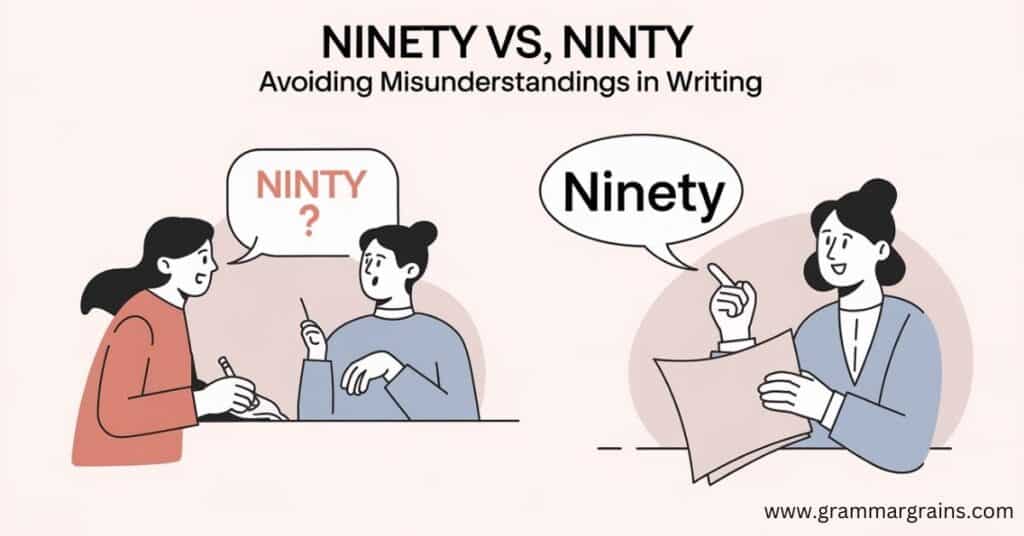
Misunderstandings often stem from small mistakes, like misspelling a number.
For example, consider a budget report stating, “Ninty thousand dollars.”
Readers might pause, wondering if it’s a typo or an unfamiliar term.
Such errors can disrupt the flow of communication and lead to unnecessary questions.
By mastering the correct spelling of words like “ninety,” you eliminate these potential stumbling blocks.
Tools like flashcards, dictionaries, and digital apps can reinforce learning, making it easier to internalize proper usage.
Pronunciation: How to Pronounce ‘Ninety’
The correct pronunciation of “ninety” involves emphasizing the first syllable: “NINE-tee.”
This contrasts with “ninty,” which lacks the elongation of the “e” sound. The subtle difference highlights the interplay between phonetics and spelling.
Understanding this can help speakers and writers align their pronunciation with standard English norms.
Resources like phonetic guides or pronunciation tutorials can further clarify these nuances, ensuring consistency in both spoken and written communication.
Phonetics Made Simple
Phonetics provides a roadmap for understanding how words sound. In the case of “ninety,” the silent “e” plays a critical role in shaping its pronunciation.
While it’s easy to overlook this detail, recognizing such patterns can enhance your grasp of English language rules.
Learning phonetics doesn’t require advanced linguistic knowledge. Simple exercises, like practicing vowel sounds or comparing similar words, can reveal the logic behind seemingly irregular spellings.
Over time, this practice strengthens both spelling and pronunciation skills.
When to Use Ninety vs. 90
Should you write “ninety” or simply use the numeral “90”? The answer depends on context.
In formal writing, spelling out numbers is often preferred for clarity.
For example, a sentence like “There are ninety participants” feels more polished than “There are 90 participants.”
However, in technical documents, numerical forms like “90” are practical and concise.
Contexts like budgets, data sheets, or timelines often rely on numerals for readability.
The key is understanding when spelled-out numbers enhance the tone and when numerals streamline communication.
Should 90 Be Spelled Out?
General guidelines suggest spelling out numbers below ten in most forms of writing.
For numbers like ninety, the choice depends on the style guide you’re following.
In creative or literary writing, spelling it out can add a touch of elegance.
In contrast, fields like journalism or scientific writing favor numerals for their brevity.
Knowing these conventions helps you adapt your approach to fit different audiences and purposes, ensuring both accuracy and impact.
Writing Tips for Mastering Spelling
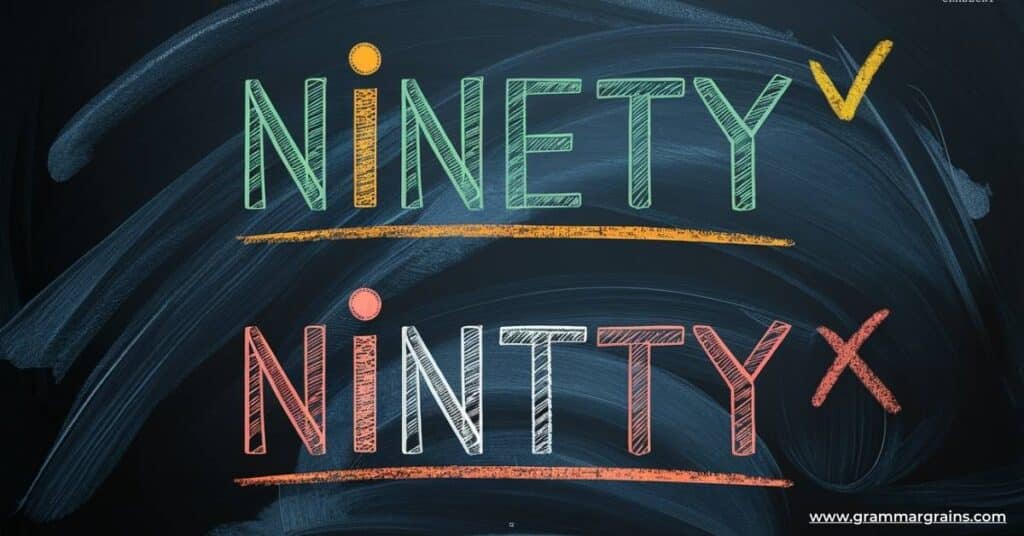
Improving your spelling involves consistent practice and clever techniques.
One useful strategy is the drop rule, which clarifies when to drop or retain letters during spelling changes.
For instance, when forming “ninety,” you retain the “e” from “nine” because it’s integral to the base word.
Mnemonics can also make spelling easier.
For “ninety,” try this: “Nine has a silent partner, E, who helps it become Ninety.”
By visualizing relationships between letters, you’ll reinforce correct spelling in your memory.
Flashcards, spelling apps, and even reading more frequently can sharpen your skills further.
Using Mnemonics for Clarity
Mnemonics are memory aids that simplify complex rules.
For example, to remember the spelling of “ninety,” associate it with a phrase like “Nine’s elegant tie.”
Such tricks are effective because they tie abstract spelling rules to vivid mental images.
These tools are especially helpful for young learners or non-native English speakers.
Coupled with resources like dictionaries and spelling apps, mnemonics create a fun and engaging way to master difficult words.
Regular practice with these methods builds confidence in spelling.
Common Misspellings and Their Impacts
Misspelling “ninety” as “ninty” is a prime example of how simple errors can disrupt communication. Such mistakes, while common, can have broader implications, particularly in professional or academic contexts.
For instance, a presentation slide that reads “Ninty percent” might distract the audience from the main message.
Avoiding these errors requires attention to detail and familiarity with common misspellings.
Review documents thoroughly and rely on spell-check tools when necessary.
Over time, these habits will significantly reduce errors and enhance your writing clarity.
Trick to Remembering Which One to Use
If you’re struggling to remember whether it’s “ninety” or “ninty,” consider this simple trick: think of “nine” and add “-ty.”
This aligns with how the word is derived, reinforcing the correct spelling.
Visualization also helps—imagine the word “ninety” written in bold, and compare it with “ninty” to highlight the missing “e.”
Another way to cement the correct form is by creating sample sentences.
For example, write, “I saved ninety bucks this week,” and repeat it aloud.
Such exercises reinforce both spelling and usage, ensuring accuracy every time.
Historical or Etymological Exploration
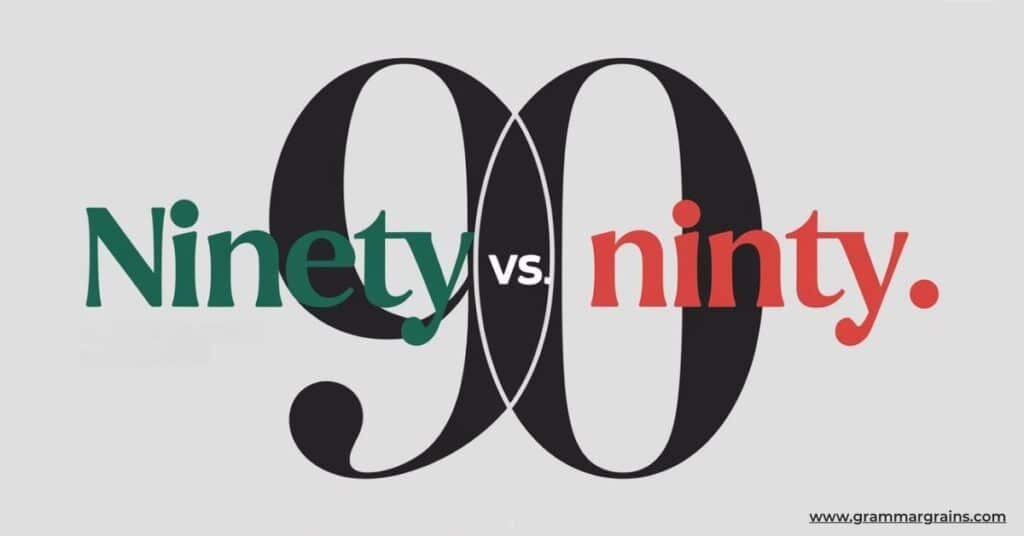
Exploring the roots of “ninety” offers fascinating insights into how English words evolve.
Derived from Old English “nigontig,” the term reflects an era when spelling was heavily influenced by pronunciation and regional dialects.
Over time, standardization brought about the current form, which prioritizes clarity and consistency.
Understanding this history underscores why “ninety” remains correct while “ninty” doesn’t.
As English transitioned through Middle and Modern phases, it adopted spelling conventions that prioritized readability.
Recognizing these patterns can demystify seemingly irregular spellings, making them easier to learn.
Cultural or Regional Differences
While English is a global language, regional differences in spelling and usage persist.
In most English-speaking countries, “ninety” is universally accepted.
However, non-native speakers might default to “ninty” due to its phonetic simplicity.
Addressing this common confusion requires targeted education and awareness.
In some regions, casual communication might tolerate variations, but formal contexts demand precision.
Learning standard spelling ensures your writing resonates across audiences, whether in professional settings or casual conversation.
Common Typo and Keyboard Issues
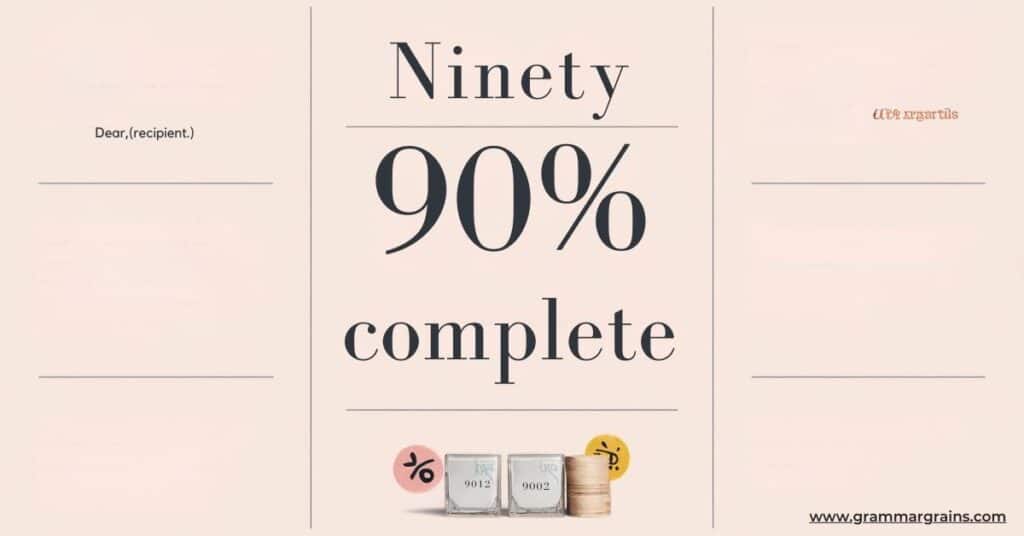
Modern technology has introduced new challenges to spelling.
Typing quickly on a keyboard or phone often leads to typos, with “ninty” emerging as a frequent error.
Auto-correct tools can help, but they’re not foolproof.
Reviewing your work before hitting send is crucial.
If you’re drafting content for platforms like Facebook or Twitter, take an extra moment to check for accuracy.
Over time, this habit minimizes errors and reinforces your spelling skills.
Educational Tools or Resources
To master spelling, leverage resources like flashcards, dictionaries, and spelling apps.
Websites and online courses focused on English grammar can also provide valuable insights.
For example, tools like Grammarly highlight spelling mistakes and suggest corrections in real time.
Educational games, particularly those aimed at children, make learning fun.
Word puzzles, quizzes, and interactive activities build familiarity with words like “ninety” while improving overall language skills.
Incorporating these resources into daily practice ensures steady progress.
Specific Instances Where ‘Ninety’ Should Be Used
In formal writing, spelling out “ninety” is often required to maintain a polished tone.
This applies to academic papers, legal documents, and professional correspondence.
For instance, writing “Ninety thousand dollars” in a contract leaves no room for ambiguity.
In contrast, informal settings like text messages or casual emails might favor the numeral “90” for brevity.
Recognizing these distinctions allows you to adapt your approach based on the audience and purpose, ensuring effective communication every time.
Ninety vs. Ninetieth: What’s the Difference?
Understanding the difference between “ninety” and “ninetieth” is key to avoiding errors. While “ninety” refers to the number itself, “ninetieth” denotes an ordinal position, such as “the ninetieth day of the year.”
Mixing these terms can confuse readers, particularly in detailed contexts.
To clarify, create a mental association: “Ninety bucks” relates to quantity, while “ninetieth anniversary” emphasizes sequence.
Practice using these terms in sentences to reinforce their distinct meanings and applications.
Final Thoughts
The debate between “ninety” and “ninty” highlights the importance of understanding language conventions. While the correct spelling is rooted in history, its continued relevance depends on consistent usage.
By using tools like mnemonics, flashcards, and dictionaries, you can easily remember tricky spellings. Embracing these strategies not only improves accuracy but also deepens your appreciation for the rich tapestry of the English language.
FAQs
Which Is Correct: Ninety or Ninty?
“Ninety” is the correct spelling. “Ninty” is a common misspelling that arises from phonetic confusion.
Should 90 Be Spelled Out?
In formal writing, it’s often appropriate to spell out “ninety.” However, in technical or informal contexts, the numeral “90” is acceptable.

Taila Lucy, an expert content writer at Grammar Grains, brings 4 years of experience crafting engaging pieces on grammar. Her work delves into synonyms, antonyms, slang, puns, and poetry, helping readers master English with creativity and flair.
